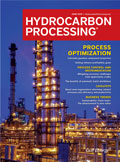
June 2019
Special Focus: Process Optimization
While the ultimate purpose of operating a refinery is to produce gasoline, diesel or asphalt, key objectives include improving return on investment (ROI), net profitability and cash flow.
The US is the largest “gasoline guzzler” in the world, producing and consuming about 9 MMbpd of gasoline—global production is approximately 45 MMbpd.
It is difficult to revamp an existing air-cooled steam surface condenser (ACSSC) for higher throughput, since most ACSSC suppliers have changed to a single-tube row design and have discontinued their multi-tube row design.
Catalysts
Catalytic reforming has been a staple in petroleum refining since 1949.
Heat Transfer
Plate-and-frame (P&F) heat exchangers were first manufactured 100 yr ago for use in the dairy industry.
Process Control and Instrumentation
Process control methods have been applied to batch distillation of crude oil and intermediate oils performed in the Chevron DPST labs in Richmond, California.
High-quality crudes are not always readily available, or at a price that is acceptable to the producer’s budget.
Approximately 700 refineries are in operation worldwide, producing a range of petroleum products including gasoline, diesel, jet fuel, liquified petroleum gas (LPG) and fuel oils.
Maintenance and Reliability
Numerous plants around the world operate with hazardous oil and gas, petrochemicals and refining fluids that have surpassed their design life.
Project Management
You have made the decision to increase plant capacity—with a change in feed—in the existing facility.
Environment and Safety
Safety requirements within nuclear power plants (NPPs) have encouraged the development of several rigorous methodologies that, in turn, have stimulated excellence in operability, reliability, availability and maintenance (RAM) to the extent that numerous guides and standards now regulate that industry.
Columns
What is the first thing that comes to mind when we hear the word optimization?
Since its inception in June 1990, more than half of the 347 “HP Reliability” columns published in Hydrocarbon Processing have incorporated consulting experiences and communications that span the globe.
As environmental concerns emerging from the incessant consumption of fuels have gripped the attention of global leaders, energy producers have been developing cleaner fuel alternatives for use in domestic and commercial settings.
Vibrating equipment can be machines, such as vibrating screens, conveyor pans or a combination of both, that are designed to transport, sort or dry materials.
The persistent volatility of energy prices is well known, and sustained price movements have fueled a boom-and-bust cycle in different energy sectors for decades.
Whether it is heating process fluids to achieve enough temperature in crude atmospheric and vacuum distillation units, or reaction temperatures inside furnace tubes to produce ethylene, vinyl chloride monomer, synthetic gas and continuous catalytic reformer reactors, or simple process heating (thermal fluid), process furnaces play a critical role in refineries and petrochemical complexes.
Trends & Resources
Throughout Hydrocarbon Processing’s 97 yr of publishing technical material for the refining and petrochemical industries, the journal has focused on numerous topics to optimize downstream processing facility operations.
In April, Hydrocarbon Processing launched the first iteration of its HP Sustainability webcast series.
In the US, continued gasoline–related tightening exerted upside pressure on prices, despite improvement in refinery throughputs as refineries returned online.
Sinochem Hongrun Petrochemical Co. Ltd. will use Honeywell UOP’s ionic liquids alkylation technology to produce high-octane, cleaner-burning transportation fuels.
Librestream and ecom, a Pepperl+Fuchs brand, have collaborated on an innovation for asset analysis and safety inspections in hazardous locations: the Onsight Cube-Ex wearable camera.

- SkyNRG starts construction on its first SAF plant in Delfzijl, the Netherlands 2/13
- India's Reliance wins U.S. license for Venezuelan oil 2/13
- Singapore light distillates stocks hit over 3-yr high on robust imports 2/13
- Three contractors injured at ExxonMobil facility in Beaumont, Texas (U.S.) 2/13
- China's epic renewables boom lifts it into rare clean capacity club 2/13
- TotalEnergies booked loss in France due to refining activities, CEO says 2/13




